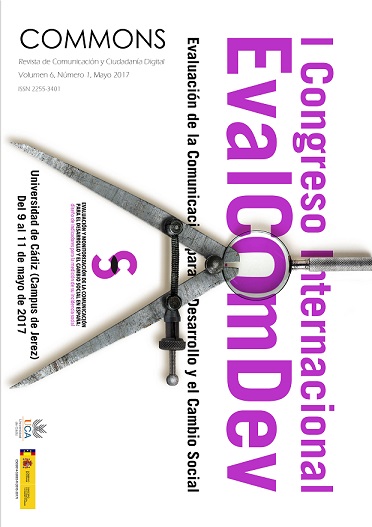El problema del éxito en la comunicación para el cambio social

Archivos adicionales
Información
Resumen
Este ensayo breve propone elementos para una discusión crítica del problema del éxito en la investigación de la comunicación para el cambio social, y sugiere alternativas superadoras de las demandas impuestas por organismos gubernamentales y agencias de financiación a nivel nacional e internacional.
Palabras clave
Descargas
Cómo citar
Licencia
Aquellos autores/as que tengan publicaciones con esta revista, aceptan los términos siguientes:
- Los autores/as conservarán sus derechos de autor y garantizarán a la revista el derecho de primera publicación de su obra, el cual estará simultáneamente sujeto a la Licencia de reconocimiento de Creative Commons 3.0, que permite a terceros compartir la obra siempre que se indique su autor y su primera publicación esta revista.
- Los autores/as podrán adoptar otros acuerdos de licencia no exclusiva de distribución de la versión de la obra publicada (p. ej.: depositarla en un archivo telemático institucional o publicarla en un volumen monográfico) siempre que se indique la publicación inicial en esta revista.
- Se permite y recomienda a los autores/as difundir su obra a través de Internet (p. ej.: en archivos telemáticos institucionales o en su página web) antes y durante el proceso de envío, lo cual puede producir intercambios interesantes y aumentar las citas de la obra publicada. (Véase El efecto del acceso abierto).
Citas
Fraser, N. (2008). Scales of Justice / Reimagining Political Space in a Globalized World.Cambridge: Polity Press.
Enghel, M.F. (2014) Video letters, mediation and (proper) distance: A qualitative study of international development communication in practice. Karlstad: Karlstad University Press.
Enghel, M.F. (2015) “Towards a political economy of communication in development?” in Nordicom Review 36 [Special Issue].
Enghel, M.F. (2016) “Understanding the donor-driven practice of development communication: from media engagement to a politics of mediation” in Global Media Journal/Canadian edition, Vol. 9, Issue 1 [Special Issue].
Enghel, M.F. and Wilkins, K. co-editors (2012) Special Issue of Nordicom Review: Communication, Media and Development: Problems and Perspectives. Vol. 33 – 1.
García Canclini, N. (2006). Diferentes, desiguales y desconectados: mapas de la interculturalidad. Barcelona: Gedisa.
Hall, Stuart (1980) Encoding and decoding. In Hall, S., Hobson, D., Lowe, A. and Willis, P. (eds.) Culture, media and language. London: Hutchinson.
Inagaki, N. (2007). Communicating the impact of communication for development: recent trends in empirical research. Washington: The World Bank.
Marí, Víctor (2013) “Comunicación, desarrollo y cambio social en España: enre la institucionalización y la implosión del campo”. En Commons, Volumen 2, Número 3.
Morris, N. (2003). A comparative analysis of the diffusion and participatory models in development communication. Communication Theory, 225-248.
Ogan, C., Bashir, M., Camaj, L., Luo, Y., Gaddie, B., Pennington, R., et al. (2009). Development communication: the state of research in an era of ICTs and globalization. The International Communication Gazette, 655-670.
Quarry, Wendy y Ramírez, Ricardo (2014) Comunicación para otro desarrollo: escuchar antes de hablar. Madrid: Editorial Popular.
Shah, H. (2007).Meta-research of Development Communication Studies, 1997–2005’.ICA Conference. San Francisco.
Lewis, David (2012) Reality Check Reflection Report. Stockholm: SIDA.
Skuse, A., Rodger, D., Power, G., Mbus, D., & Brimacombe, T. (2013). Communication for Development Interventions in Fragile States: A Systematic Review. Adelaide: JBI Database of Systematic Reviews & Implementation Reports.
Waisbord, Silvio (2015) "Three challenges for global communication and social change". En Communication Theory, Volume 25, Issue 2, pages 177–258.
Wilkins, Karin (2009) “What’s in a name?”. En Glocal Times, No. 13.
Wilkins, K. (2008). Development Communication. In W. Donsbach, The International Encyclopedia of Communication. Online: Blackwell Publishing.
Williams, R. (1983). Keywords: a vocabulary of society and culture. New York: Oxford University Press.


